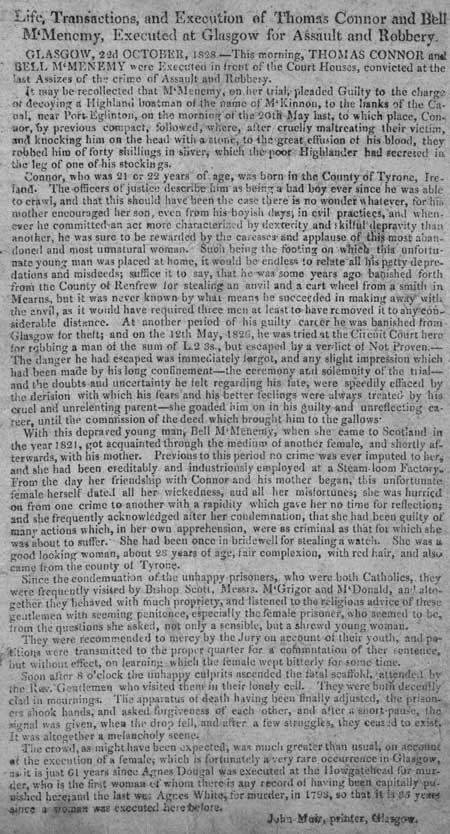Transcription
Life, Transactions, and Execution of Thomas Connor and Bell
M'Mencmy, Executed at Glasgow for Assault and Robbery. GLASGOW, 22d OCTOBER, 1828.?This morning, THOMAS CONNOR and
BELL M'MENEMY were Executed in front of the Court Houses, convicted at the
last Assizes of the crime of Assault and Rebbery. It may be recollected that M'Menemy, on her trial, pleaded Guilty to the charge
of decoying a Highland boatman of the name of M'Kinnon, to the banks of the Ca-
nal, near Port-Eglinton, on the morning of the 20th May last, to which place, Con-
nor, by previous compact, followed, where, after cruelly maltreating their victim,
and knocking him on the head with a stone, to the great effusion of his blood, they
robbed him of forty shillings in silver, which the poor Highlander had secreted in.
the leg of one of his stockings. Connor, who was 21 or 22 years of age, was born in the County of Tyrone, Ire-
land. The officers of justice describe him as being a bad boy ever since he was able
to crawl, and that this should have been the case there is no wonder whatever, for his
mother encouraged her son, even from his boyish days, in evil practices, and when-
ever he committeed an act more characterized by dexterity and skilful depravity than
another, he was sure to be rewarded by the caresses and applause of this most aban-
doned and most unnatural woman. Such being the footing on which this unfortu-
nate young man was placed at home, it would be endless to relate all his petty depre-
dations and misdeeds; suffice it to say, that he was some years ago banished forth
from the County of Renfrew for stealing an anvil and a cart wheel from a smith in
Mearns, but it was never known by what means he succeeded in making away with
the anvil, as it would have required three men at least to have removed it to any con-
siderable distance. At another period of his guilty career he was banished from
Glasgow for theft; and on the 12th May, 1826, he was tried at the Circuit Court here
for robbing a man of the sum of L.2 3s., but escaped by a verdict of Not Proven.?
The danger he had escaped was immediately forgot, and any slight impression which
had been made by his long consinement?the ceremony and solemnity of the trial?
and the doubts and uncertainty he felt regarding his fate, were speedily effaced by
the decision with which his fears and his better feelings were always treated by his
cruel and unrelenting parent?she goaded him on in his guilty and unreflecting ca-
reer, until the commission of the deed which brought him to the gallows. With this depraved young man, Bell M'Menemy,when she came to Scotland in
the year 1821, got acquainted through the medium of another female, and shortly af-
terwards, with his mother. Previous to this period no crime was ever imputed to her,
and she had been creditably and industriously employed at a Steam loom Factory
From the day her friendship with Connor and his mother began, this unfortunate
female herself dated all her wickedness, aud all her misfortunes; she was hurried
on from one crime to another with a rapidity which gave her no time for reflection;
and she frequently acknowledged after her condemnation, that she had been guilty of
many actions which, in her own apprehension, were as criminal as that for which she
was about to suffer. She had been once in bridewell for stealing a watch. She was a
good looking woman, about 23 years of age, fair complexion, with red hair, and also
came from the county of Tyrone. Since the condemnation of the unhappy prisoners, who were both Catholics, they
were frequently visited by Bishop Scott, Messrs. M'Grigor and M'Donald, and alto-
gether they behaved with much propriety, and listened to the religious advice of these
gentlemen with seeming penitence, especially the female prisoner, who seemed to be
from the questions she asked, not only a sensible, but a shrewd young woman. They were recommended to mercy by the Jury on account of their youth, and pe-
titions were transmitted to the proper quarter for a commutation of ther sentence,
but without effect, on learning which the female wept bitterly for some time. Soon after 8 o'clock the unhappy culprits ascended the fatal scaffold, attended by
the Rev. Gentlemen who visited them in their lonely cell. They were both decently
clad in mournings. The apparatus of death having been finally adjusted, the prison-
ers shook hands, and asked forgiveness of each other, and after a short pause, the
signal was given, when the drop fell, and after a few struggles, they ceased to exist.
It was altogether a melancholy scene. The crowd, as might have been expected, was much greater than usual, on account
of the execution of a female, which is fortunately a very rare occurrence in Glasgow,
as it is just 61 years since Agnes Dougal was executed at the Howgathead for mur-
der, who is the first woman of whom there is any record of having been capitally pu-
nished here; and the last was Agnes White for murder, in 1793, so that it is 35 years
since a woman was executed here before. John Muir, printer Glasgow.
View Commentary | Download PDF Facsimile
|
 |
Date of publication:
1828 shelfmark: L.C.Fol.73(104)
 View larger image
View larger image
|


